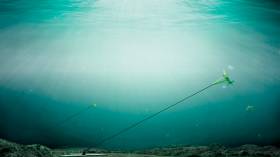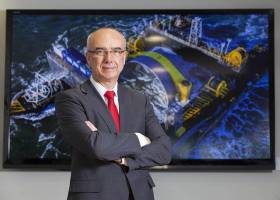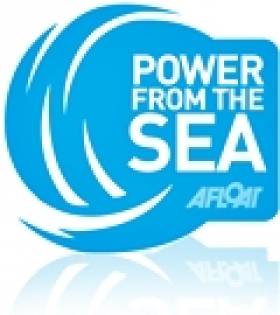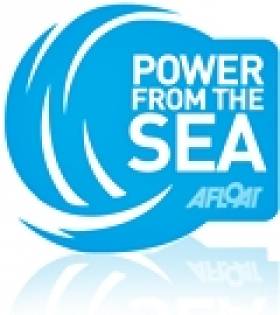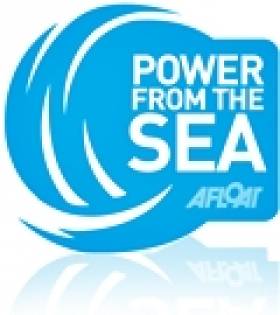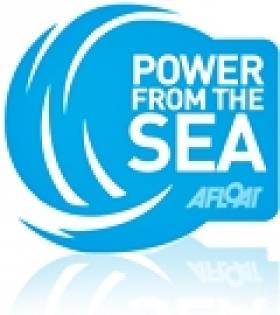Displaying items by tag: tidal energy
Australian Harbour Testing Its Potential as Tidal Energy Hub
A harbour near Melbourne in Australia is probing the potential of its natural tides to develop a new kind of renewable energy hub.
As the Bellarine Times reports, Queenscliff Harbour has partnered with the non-profit Southern Ocean Environmental Link and tidal turbine maker Altum Green Energy to install a device near the harbour’s marina.
The area of Port Phillip Heads, also known as The Rip, is at the narrow entrance to the large bay on which Melbourne lies to the northeast.
Its large tidal flows make it a treacherous stretch for boating and shipping, but a potentially rich one for generating power from the sea.
The joint project is currently collecting measurements at the location to determine its potential and best positioning for the Altum turbine, which is designed to operate in slow-flowing waters such as at ports and bridges, rivers, canals and islands.
The Bellarine Times has more on the story HERE.
Exploring development of the “next generation” tidal energy technology is the theme of a new project initiated by NUI Galway (NUIG).
The university says the tidal energy project is part of its “Global Challenges” programme, a targeted research initiative to tackle six of the globe’s most pressing issues.
The project will focus on new technology and tidal turbine blades, site modelling, and the assessment of climate change impact and extreme events on same.
It will include an economic appraisal of tidal energy and the investigation of societal attitudes; and stakeholder engagement to better understand the needs and concerns of tidal energy developers, local authorities and the coastal communities.
It will also research systems to assess the interactions of tidal energy infrastructure with wildlife.
Five PhD researchers will be recruited for the project.
Globally, the tidal energy resource is estimated at more than 1200 terawatts per annum - a unit of power equal to one trillion watts.
The world uses 17.7 terawatts a year, according to the NUIG researchers.
The project will be led by Prof Jamie Goggins, professor of civil engineering, MaREI Centre, Ryan Institute and School of Engineering at NUIG.
He said the project “will engage with multiple stakeholders - including the people living in the coastal communities - to unlock the potential benefits for them in our drive to decarbonise the economy”.
“The just transition is crucial in the work towards decarbonisation. So too is the importance placed on biodiversity and how we enhance the health and resilience of our ocean and coastal communities,”he said.
“ Our aim in the tidal energy project is to create a blueprint to simultaneously achieve these ambitions,”Prof Goggins added.
The NUI Galway Global Challenges fund is part of the university’s new Research and Innovation Strategy 2021-26.
It has six areas of focus - antimicrobial resistance, decarbonisation, democracy, food security, human-centred data, and ocean and coastal health.
Further information is available here
Northern Ireland Aims To Make The Most Of Its Tidal Energy Resources
#SeaPower - Northern Ireland is well placed to capitalise on the growing trend towards renewable energy thanks to its unique tidal resources, according to a leading researcher in the field.
Dr Carwyn Frost of Queen’s University Belfast tells Emily McDaid of local tech incubator Catalyst Inc that the Narrows between Strangford Lough and the Irish Sea have the perfect conditions to harness the power of the sea’s tides — in shallow waters away from ocean swell, and more accessible than similar sites in the far north of Scotland.
The area was previously home to the world’s first tidal power station in the form of the SeaGen turbine, and has since been a test site for new projects such as the PowerKite developing the next generation of tidal energy devices.
Silicon Republic has much more on the story HERE.
Funding For New Tidal Energy Project At Limerick Docks
#SeaPower - A prototype tidal energy turbine project in the Shannon Estuary has received almost €100,000 in funding for further development, as the Limerick Post reports.
GKinetic has been testing a scale prototype of its new hydrokinetic turbine for the last year, at a purpose-built facility in Limerick Docks set up in tandem with the Shannon Foynes Port Company.
The new funding of €99,562 from the Sustainable Energy Authority of Ireland’s (SEAI) Prototype Development Fund will support testing on an improved prototype from August for a six-week period, as the company ramps up plans to scale up the design to a 250kW tidal device.
GKinetic’s technology is already being commercialised by fellow Co Limerick company DesignPro, who secured funding earlier this year under the Horizon 2020 project to test its own river energy devices at scale.
The Limerick Post has much more on the story HERE.
OpenHydro appoints new Chief Executive
OpenHydro, the Irish based tidal energy company and part of DCNS Energies, has appointed Mr Patrick Gougeon as their new Chief Executive Officer. The appointment signals the company’s ongoing drive towards commercialisation of its tidal technology and follows the launch of DCNS Energies, a subsidiary of the DCNS Group which recently secured €100m in investment.
Mr Gougeon joined OpenHydro at the start of January 2017, having previously held the position of CEO of Colibrys, a high-technology industrial company based in Switzerland. He is an engineer from the French Ecole Centrale de Lille and holds an MBA from the HEC School of Management in Paris.
With over twenty years’ experience in delivering global technological projects and transforming organizations in the industrial sector, Mr Gougeon’s senior management career to date has encompassed roles including consultancy in strategy and organisation in McKinsey & Company, as well as change management, international business development, industrial and program management as a successful executive in the Thales and Safran groups.
Thierry Kalaquin, Senior Vice President of Energies at DCNS, said: “We are delighted to be welcoming Patrick to this role, following a successful year in 2016, which saw us deliver significant tidal technology development. We now look forward to moving towards a fully commercial tidal energy solution and servicing our global portfolio of projects.”
Operating out of OpenHydro’s Dublin offices and its Technical Centre in Greenore, Co. Louth, Mr Gougeon heads up a business that has strong plans to expand both locally and internationally.
Commenting on his appointment, Patrick Gougeon said: “I am really looking forward to taking up the challenge to lead OpenHydro’ s team during this exciting phase of its’ evolution. My immediate focus is to ensure that we are well placed for the next stage of growth and opportunities that lie ahead, with the right people, organization, technology and partners in place.”
Irish Firm OpenHydro To Deliver Tidal Energy
James Ives, CEO at tidal energy company OpenHydro will speaking tomorrow at the Ocean Energy Europe Conference being held this week in Croke Park in Dublin. Ives will tell how the Irish marine renewable firm is to be the global leader in tidal solutions, profitably delivering economic marine renewable energy.
The Department of Communications says that €4.5m. will be allocated to ocean energy research in Ireland under Budget provisions next year. Total allocation for energy efficiency and renewable energy onshore and offshore next year is €68m. €9 million is being provided for geoscience initiatives including the INFOMAR and TELLUS programmes, which will support expanded geoscience research in Ireland’s offshore and onshore.
OpenHydro, a DCNS company, based in Ireland, is a technology business that designs and manufactures marine turbines to generate renewable energy from tidal streams. The company's vision is to deploy farms of tidal turbines under the world's oceans - silently and invisibly generating electricity at no cost to the environment. OpenHydro's technology enables the ocean's immense energy to be harnessed for the benefit of all. The electricity produced is completely renewable since it relies on tides that are created by the gravitational effect of the sun and moon. Through this innovative technology, OpenHydro will extract energy from the oceans in an economically viable and environmentally sensitive manner.
OpenHydro has developed the innovative Open-Centre Turbine technology which is a shrouded, horizontal-axis turbine. Simplicity is the key advantage of this technology: manufactured from a small number of components and with only one single moving part (the rotor). There is no need for oils, seals or a gearbox and this not only reduces the requirement for maintenance but ensures reliable performance in the harsh environment that is the World’s oceans. The turbines, each supported on a subsea structure, are placed directly onto the seabed, deep enough so as not to pose a hazard to shipping traffic overhead and the standard OpenHydro product has a diameter of 16m and is rated at 2MW. OpenHydro has also developed a patented method to install the Open-Centre Turbines, allowing all deployments to be completed in a single tidal cycle; less than 6 hours.
OpenHydro is at the fore-front of the tidal industry, with nearly one gigawatt of development in progress across multiple sites in Europe and North America.
Scottish Tidal Energy Scheme Gets Green Light From Financiers
#SeaPower - What's been described as the world's largest planned tidal energy scheme has been given the green light by its financiers, with construction set to begin off the northern Scottish coast in the new year, as The Guardian reports.
Previously detailed last month on Afloat.ie, the MeyGen project – comprising 269 turbines on the seabed off Caithness in the far north of mainland Scotland – will see onshore construction get under way next month after developers Atlantis Resources satisfied the conditions to draw down funds from The Crown Estate of Scottish Enterprise.
MeyGen aims to harness the strong currents at the Ness of Quoys in Pentland Firth to generate energy at levels "on a part with wind turbines" but hidden from view beneath the waves - with the first power from the sea to be delivered to Britain's national grid by 2016.
Scottish Firm Taking Wind Farms Underwater
#PowerFromTheSea - The next big renewable energy turbine farm could be underwater off the coast of Scotland, as MailOnline reports.
Scottish firm MayGen has big plans to install a £51 million (€65.2 million) underwater turbine project to harness the powerful currents of their country's coastal waters.
This new project, earmarked for Pentland Firth at Caithness in the far north of mainland Scotland, follows separate plans to install the world's largest tidal power facility in the Sound of Islay.
MayGen - which has just won an award for its parent company Atlantis Resources for its "significant contribution" to the marine renewables industry – says its state-of-the-art technology is "on a par with wind turbines" in terms of productivity, but would be hidden from the view of those who find the larger land-based wind farms unsightly.
The Pentland Firth project will be the new design's proving ground, with hopes that it will generate power for nearly half a million homes upon completion in 2020.
MailOnline has more on the story HERE.
Sea Power Projects Could Be Good for Marine Wildlife Says Report
#POWER FROM THE SEA - Marine-based renewable energy projects could be introduced without a damaging impact on marine wildlife, according to a new briefing paper from Friends of the Earth.
Business Green reports on the paper from the environmental campaign group, written by marine ecologist Martin Attrill of Plymouth University's Marine Institute, which draws together research on the biodiversity impact of offshore wave energy, tidal energy and wind power schemes.
Attrill found that the deployment of sea energy arrays could ultimately benefit many marine species by reducing the effects of fishing activity, and even acting as reefs to attract new sea life.
He cites the example of a grey seal colony in Strangford Lough that has steered clear of a nearby tidal turbine over the three years of its operation in the lough.
However, Business Green says the report makes clear that the deployment of such projects "must be done sensitively", noting that any negative impact on biodiversity "would be significantly lower than the damage done to marine wildlife by rising sea levels caused by climate change".
Business Green has more on the story HERE.
UCC Wave Energy Trials Central to New Maritime Cluster
#POWER FROM THE SEA - A €9 million Europe-wide wave energy trial programme is one of the key elements of a new Government programme designed to transform Ireland as a maritime nation.
According to The Irish Times, University College Cork's Hydraulics and Maritime Research Centre will run testing of wave energy, tidal energy and offshore wind energy devices across a network of sites in 12 European countries participating in the new marine renewables infrastructure network Marinet.
Irish test sites in the network include the national ocean test facility in Cork and centres operated by the Sustainable Energy Authority of Ireland (SEAI) at Galway Bay and Belmullet.
The UCC centre also forms part of the new Irish Maritime and Energy Resource Cluster (IMERC), launched last Friday by Taoiseach Enda Kenny.
The cluster comprises UCC, the Irish Naval Service, Cork Institute of Technology and the National Maritime College of Ireland with the initial aim of creating 70 new research jobs by 2014 in the areas of wave energy, green shipping and sustainability of ocean resources.
IMERC director Dr Val Cummins said: “The aim of IMERC is to promote Ireland as a world-renowned research and development location that will unlock Ireland’s maritime and energy potential."
The Irish Times has more on the story HERE.
- Irish Naval Service
- maritime
- Cork
- Galway Bay
- Belmullet
- National Maritime College of Ireland
- wind energy
- UCC
- Cork Institute of Technology
- renewable energy
- wave energy
- sustainable energy
- tidal energy
- network
- testing
- Sustainable Energy Authority of Ireland
- Taoiseach Enda Kenny
- SEAI
- Hydraulics and Maritime Research Centre
- Marinet
- devices
- Irish Maritime and Energy Resource Cluster
- IMERC
- Dr Val Cummins


























